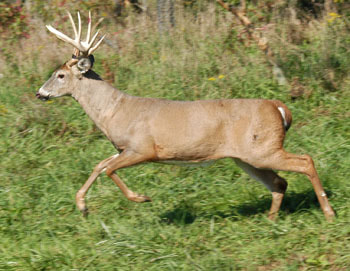 According to the Pennsylvania Game Commission, chronic wasting disease (CWD) continues to spread to new parts of Pennsylvania, infecting and killing deer and threatening the deer hunting tradition. West Nile virus has also left Pennsylvania’s state bird, the ruffed grouse, with an uncertain future. At no time in history has disease posed more problems for wildlife and its conservation, says the Pennsylvania Game Commission (PGC) in a prepared release. In light of that, the PGC established a new partnership between it and the University of Pennsylvania’s School of Veterinary Medicine (Penn Vet) to address those problems head-on. Both agencies announced that Pennsylvania Wildlife Futures is a new wildlife health program that will increase disease surveillance, management and research to better protect wildlife across the Commonwealth. Says the PGC, hunters who submit samples from deer they harvest for chronic wasting disease (CWD) testing, the partnership will provide much faster turnaround for test results – about seven to 10 days as opposed to weeks or sometimes months – as well as the ability to track test results online. But there are broader benefits, as well. “The Pennsylvania Wildlife Futures Program will dedicate 12 employees, one of them working full-time out of the PGCs Harrisburg headquarters, to address wildlife diseases. Not only will that allow for more thorough disease documentation, research and management, it will allow agency biologists to spend less time dealing with disease issues and more time focusing on managing wildlife populations,” said Travis Lau, PGC media relations manager. PGC Bureau of Wildlife Management Director Dr. Matthew Schnupp added that the Pennsylvania Wildlife Futures Program demonstrates how public-private partnerships can advance the health of our wildlife and the resilience of their habitats. “Our research-oriented partnership with Penn Vet will be invaluable in helping us define wildlife diseases, their impacts, and how we can manage them,” Schnupp opines. Based out of Penn Vet’s New Bolton Center located in Kennett Square, Pa., the Pennsylvania Wildlife Futures Program will be led by ecologist Dr. Julie Ellis, and veterinarian and toxicologist Dr. Lisa Murphy. “The Pennsylvania Wildlife Futures Program establishes a sustainable infrastructure for collaboration, and really represents a paradigm shift in managing wildlife disease,” said Dr. Ellis. “Not only are we charting a novel and comprehensive program that helps protect Pennsylvania wildlife, but ultimately, we are working to safeguard the health of Pennsylvania’s nearly 13 million residents from the potential impacts of wildlife disease. Land use in Pennsylvania is changing, and wildlife species are coming into closer contact with humans. We need to be prepared for these possible, broader consequences on both animal and human health.” “As the state’s only veterinary school, Penn Vet has a depth of experience investigating disease in veterinary medicine,” said Dr. Murphy. “Through our affiliation with the Pennsylvania Animal Diagnostic Laboratory System (PADLS), we have the capacity and wildlife health expertise to support this exciting new partnership with the PGC.” The Pennsylvania Wildlife Futures Program was established under a five-year, $10 million contract financed by the Game Commission, and Penn Vet was the only university to submit a bid for the work. PGC Executive Director Bryan Burhans said the program is a necessary expense in an age when impacts are mounting from many wildlife diseases, some of which afflict humans.
0 Comments
Leave a Reply. |
AuthorNick Hromiak has been an outdoors and automotive writer for over 30 years. He's been published in numerous national and state-wide outdoor magazines and newspapers.
|
Proudly powered by Weebly
 RSS Feed
RSS Feed